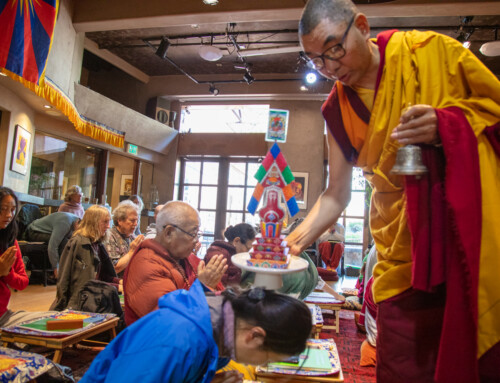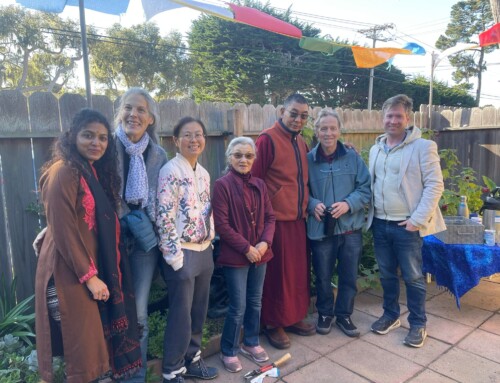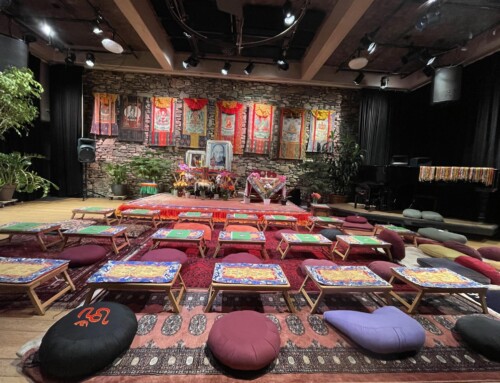During the time of the Buddha over 2,500 years ago, one day early in the morning, the Buddha was seated under a tree meditating. While he was seated, a droplet of water fell on his head. Noticing this, the Buddha opened his eyes and looked up, where he spotted a crow overhead. This crow was perched by himself, sorrowfully shedding tears. The Buddha, full of kindness, thought to himself, I wonder what has befallen this poor crow. Then, addressing the crow, the Buddha said, “Crow, my dear friend, what has happened to you? Why are you weeping?” Then, the crow responded, “Oh Lord Buddha, I am so very sad.” The Buddha then beckoned the bird to descend and converse with him.
After hearing his predicament, the Buddha responded, saying, “Oh crow, this is actually a very small, trivial problem. In reality, you have created your own problem; you say that no one likes you because of your color. Whether someone likes the color black or not in this region that you’ve mentioned, I’m not sure. Actually, your color is very beautiful. I believe that many people do like the color black, whereas other people don’t like white; we don’t know.” Then, the Buddha said to the crow, “Would you like to meet a white bird in order to see what he thinks?” The crow responded, “Yes, I’d love to meet him.” So, the Buddha sent the crow to see the white bird.
The crow traversed the sky and in a different region, he finally saw the sea. Far below along the beach, the crow spotted a beautiful white bird, similar to a seagull. Incidentally, as he approached the white bird, the crow realized that he was sitting by himself and was crying. The crow greeted him, asking, “My brother, why are you crying?” The white bird responded, saying, “Oh crow, I’m very sad. In this territory, no one likes my white color, nor do they approve of my lifestyle of catching and eating fish. These townsfolk chase me and abuse me, and see me as a bad omen. This is my bad karma. I’m am so sad and depressed, so much so that I feel I will take my own life!” The crow thought to himself, wow, the Buddha told the truth! Here in this land, they actually do not like the color white, whereas in my area, nobody likes the color black. This is all very interesting.
Afterwards, the crow flew back to the Buddha and retold the story of meeting the white bird, noting that he had a similar experience of rejection and suffering as the crow. Actually, the crow said, it seems as though the white bird had more suffering than me! Then Buddha said, “This is absolutely the truth, these are your own mental projections; your thinking has made your small problem into a big problem. In reality, neither you nor the white bird have any problems. Both of you make your own problems.” Then, the crow thought, nonetheless, I am still really uncomfortable about my color and my situation. I really want to see the best of birds, the parrot, with his intelligence, and the peacock, with his striking beauty. The Buddha then asked the crow, “Would you like to go see them?”, to which the crow replied with a yes.
The crow was then sent by the Buddha to find a parrot. Searching in his natural habitat, the crow flew far and wide throughout the jungles and the mountains in search of a parrot, to no avail. He could not find any parrot in the wild. Perplexed, he continued to look everywhere. Because they were highly sought after as pets, all of the parrots were in captivity. Finally, he happened to spot a parrot in a cage in a small village. In this village, the parrot was sitting inside a metal cage where he had food, water, his perch, and some toys. It was a nicely set up cage. The crow flew down and greeted the parrot, saying to him, “Hello, my brother, how are you doing?” With tears in his eyes, the parrot responded that his life was full of suffering. He said to the crow, “These people took my freedom. I used to live in the beautiful mountainside with my family and friends, amongst trees, rivers, gardens, flowers, and nature, but these people snatched me up and threw me into this prison. They’ve even changed my name.” Then the crow thought to himself, he’s very handsome, with such a beautiful color. Moreover, these villagers love him. They feed him delicious treats; they speak to him, and smile and laugh when they see him. Why does he have so much suffering? The crow said to him, “Brother, here you have everything you need. People give you food, water, and a home, and these villagers come to play with you every day. Nobody gives me anything, and nobody comes to see me. And, you don’t have to worry about any predators trying to eat you!” The parrot responded, “Listen. If you have freedom, you have happiness. If you don’t have freedom, you have suffering. First and foremost, freedom is the most important thing. I don’t have freedom. I don’t want this way of life. I want to live out in nature, free, in the mountains with my family whom I miss so dearly. I am so sad and depressed, so much so that I feel I will take my own life!” Then the crow understood and thought to himself, “Wow, he really has suffering. After, he parted ways with the parrot and flew back to the Buddha.
Upon returning, the Buddha asked him, “Did you see the parrot?” He recounted everything the parrot had told him about confinement and freedom. The Buddha said, “See, this is absolutely the truth. If you have freedom, you have happiness. If you don’t have freedom, you have suffering. Even the smallest of animals need freedom.” Then the crow thought to himself, “Wow, these other birds have really serious problems; my problem is nothing.” Still, the desire to see the peacock, whom he regarded as the most beautiful of birds, remained in his mind. Knowing this, the Buddha asked him, “Dear crow, would you like to see the peacock?” He responded, “Yes,” so the Buddha sent him to see the peacock.
Searching in his natural habitat, the crow flew far and wide throughout the jungles and the mountains in search of a peacock, to no avail. He could not find any peacock in the wild. Perplexed, he continued to look everywhere. Because of their extreme beauty, all of the peacocks were in captivity. Finally, he happened upon a zoo where he spotted a peacock in an exhibit. In this zoo, he was placed in a huge enclosure that looked just like the wild. Inside his enclosure, he had food, water, and a small home. It was a nicely set up enclosure. The crow flew down and greeted the peacock, saying to him, “Hello, my brother, how are you doing?” With tears in his eyes, the peacock began sobbing. The crow then asked him, “Dear brother, why are you crying? You have such beautiful feathers. You are the best among all birds. You are stunning! Look at me!” He replied to the crow, “There’s nothing wrong with you. Actually, you are also beautiful.” Again, the peacock began sobbing. The crow thought to himself, “He is so majestic, with such beautiful feathers. Moreover, these people love him. Coming in droves, they stare at him in awe. Why does he have so much suffering? So, the crow asked him, “Brother, what is disturbing you so much here and now? Why are you not happy? You are so beautiful. And, here you have everything you need. People give you food, water, a home, and these visitors come in droves just to have a glimpse of you. They all love you!” The peacock then replied, “Listen. These human beings are truly terrible; these people took my freedom. I used to live in the beautiful mountainside with my family and friends, amongst trees, rivers, gardens, flowers, and nature, but these people snatched me up and threw me into this prison. They call this a zoo, but this is absolutely a prison. I don’t have freedom. If you have freedom, you have happiness. If you don’t have freedom, you have suffering. First and foremost, freedom is the most important thing. This is not my home. I don’t want this way of life. What I want most is to live out in nature, free, in the mountains with my family whom I miss so dearly. I am so sad and depressed, so much so that I feel I will take my own life!” Then the crow understood and thought to himself, “Wow, he really has suffering. After, he parted ways with the peacock and flew back to the Buddha.
After meeting these different birds, the crow changed his mind. Beforehand, he had thought that the best and happiest bird is the one who is the most beautiful, the most intelligent, and who is given everything like food, security, and special attention. He had assumed that they all lived a very happy life. On the contrary, he saw that their lives were full of suffering. Upon meeting the Buddha, he recounted his experiences and his understanding of the nature of suffering amongst the different birds. The Buddha then said to the crow, “See, now you understand. You understand who you are, and how lucky you are. Actually, you are very fortunate. First, you are completely free; you are able to go anywhere you please. Second, you are actually very beautiful in your own right. Although some people in your region may dislike the color black, many others may actually like your color. Lastly, you do not have any physical or mental ailments, any problems whatsoever. You’re very fortunate.” The crow prostrated to the Buddha, as he found his happiness within his own self.
This is short parable of the crow and the Buddha has many good lessons for us as human beings today. In my travels, I have met many people from different countries. Many people often complain about their situation or their home. Some Americans tell me, “Oh Khenpo, the United States is very bad. I don’t want to live here. I really want to move, I am not happy here.” Whereas some others in places like India tell me, “Oh Rinpoche, I don’t want to live in India, I want to move to the United States. I am not happy here.” Individually, you should appreciate what you have: your body, your family, your house, everything. The most important thing is contentment. As I wrote in the 22nd and 23rd verses of A Dharma Gong to Wake us from Ignorance:
།རང་ལ་ཆོག་ཤེས་མེད་ན། །སེམས་ལ་ཁེངས་དུས་མི་འདུག
།ཡུན་ཐུང་མི་ཚེ་འདི་ལ། །མང་པོ་དགོས་རྒྱུ་འདུག་གམ།
If I don’t have contentment, my mind will never be satisfied.
Is there so much that I need for my life, which is so short?
།སེམས་ལ་ཞི་བདེ་མེད་ན། །བསགས་སྲུང་ནོར་གྱིས་ཅི་བྱ།
།ནོར་གྱི་མཆོག་ནི་ཆོག་ཤེས། །བདེ་སྐྱིད་མཆོག་ནི་གཞན་ཕན།
If I have no peace of mind, what is achieved by collecting and hoarding wealth?
The supreme wealth is contentment. The supreme happiness is in helping others.
Reflecting and realizing, this is what I have, this is good and enough for me. These teachings are very relevant and practical today.
I, Khenpo Karten Rinpoche, dictated this short story to my student Karma Choeying, through a series of audio recorded messages and conversations.






